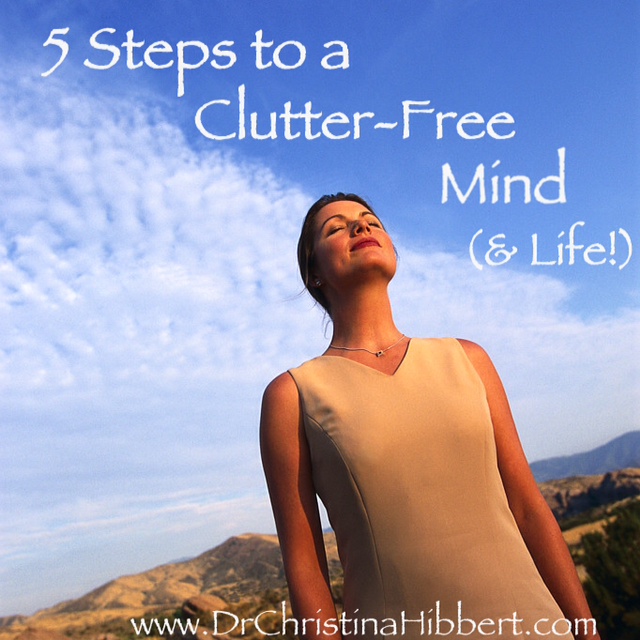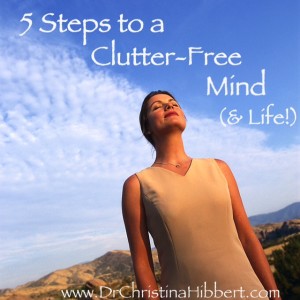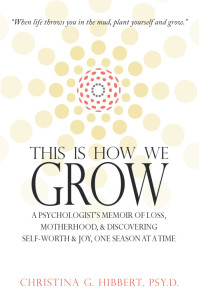
05 Sep 5 Steps to a Clutter-Free Mind (& Life!)
September is upon us once again, signaling summer is over and fall is on its way. For many, this time of year is a time of back-to-school, back-to-work, and getting families, homes, and life organized after summer fun.
I’ve been busy getting my family and me into our new schedules and routines, cleaning out the clutter we’ve gathered from summer travels, and finishing the jobs we’ve put off all summer long (like painting!). You know what they say about a cluttered home—it’s a sign of a cluttered mind. And if the mind is cluttered, then we’re bound to find less rest, feel more stressed, and experience less peace and joy. That’s why, along with organizing my family and home, I’ve been working on organizing me, and more specifically, my mind.
The 5 Steps:
So, allow me to share the 5 steps I’ve been using de-clutter my mind in hopes that it will help you de-clutter yours. Already I’m finding more of the joy that my cluttered mind has been hiding, and I expect that you will find the same. For, a clutter-free mind is the key to a clutter-free, abundant, life!
1) Slow Down: It’s hard to have a clear mind when you’re just trying to keep up with tasks, schedules, information, and activities. As one of my favorite wise men has said, “When stress levels rise, when distress appears…too often we attempt to keep up the same frantic pace or even accelerate, thinking somehow the more rushed our pace, the better off we will be…. Because (we) unnecessarily complicate (our) lives, (we) often feel increased frustration, diminished joy, and too little sense of meaning.”[1] Forcing yourself forward when you feel overwhelmed is a recipe for a meltdown. Instead, slow down, allowing you to step out of the busy, cluttered mind. (Read “Slow Down & See: How to Appreciate the Richness of Life”)
2) Get Still & Tune In: De-cluttering requires more than simply slowing down; it requires stillness. By “stillness” I mean time and space to ponder, reflect, and feel out the changes you need to make. If you fill every minute with movement and busyness you will never enjoy a peaceful mind, for your mind will continually be tuned out. Instead, tune in—in to a deeper sense of who you are and what you desire. Only through stillness and tuning in will you discover the peace lying beneath all the clutter. (More on stillness & meditation).
3) Get Real: Once you’re slowed down and still, you can remind yourself that most of what clutters your mind is unnecessary, unimportant, and unworthy of so much attention. The mind is, after all, made up of what you give your attention to. Ask yourself: “What really matters to me?” “What good things does my heart truly desire?” and write down your answers. Then ask, “Am I focusing my time on these things that matter most?” Be honest, take your time, and get real. Getting honest and real with yourself is the key to discovering the truth about how you spend your time and our mental energy. Only then can you do something about it. (Read “What Matters Most”).
4) Cut the Clutter: If you’ve worked through steps 1-3, you’re finally ready to cut the clutter. Be firm with yourself, cutting out activities, expectations, and yes, even people, who aren’t part of what matters most to you. Then, get even tougher. Cut out the thoughts and ideas that clutter your mind. (One of the thoughts I’m cutting is “I’m exhausted!” Even if it’s true, it doesn’t help to have it running through my mind!). Then, cut out the emotions that weigh you down, and seek to replace them with those that help you feel alive and well! I know this isn’t easy, so re-visit your list of what matters most, and remind yourself of why you’re cutting these things. Your new mantra can be: “If it’s not part of what matters most to me, then I don’t need it!”. (Read “Thought Management”).
5) Let the Rest Go: Let go of the need to keep unnecessary things in your life. Let go of the need to “do” just to feel like you can “be” someone of value. Remember that value doesn’t come from what you do or what you think. Value comes from who you are deep down, beneath all the mind clutter. So, get in touch with that, then let the rest go. (Read “Getting Good at The Let-Go’s).
As a bonus 6th step I’ll add, “Repeat as Needed.” De-cluttering life is a process, but if you follow these steps, your clutter-free mind can lead to an abundant life! As Bruce Lee once said, “Absorb what is useful. Discard what is not. Add what is uniquely your own.”[2] Here’s to absorbing, discarding, and adding uniqueness in the pursuit of the de-cluttered mind and life!
What helps you de-clutter your mind and life? Leave us a comment and share your thoughts!
Be sure to check out Dr. Hibbert’s Amazon Bestseller, This is How We Grow–
available now on Amazon.com!
Join my This is How We Grow Personal Growth Group!
FREE. Online. Growth. What more could you ask for?
Don’t miss a thing!
SUBSCRIBE, below, “like” my Facebook pages (Dr. Christina Hibbert; This Is How We Grow) and follow me on Twitter,Pinterest, & Instagram!
[subscribe2]
Related Articles/Posts:
Daily Mindfulness: 6 Ways to Put More Being into what You’re Doing
Summer Self-Improvement: 25 Inspirational Ideas
Create the Life You Desire!: Part 1, What’s Keeping You Stuck, & How to Get Unstuck
Living a Life of Purpose & Meaning: The Key to True Happiness
How to Feel Self-Worth: “The Pyramid of Self-Worth”
Thought Management: Part 1, The Link Between Thoughts, Feelings, Body, & Behavior
“Sleep Better, Cope Better”: 6 Insomnia Causes & Cures
5 Tips to Turn a Rainy Day Sunny: Overcoming Feelings of Depression
Women & Depression: Facts, Understanding, & Seeking Help
How to Get Your Needs Met: 4 Keys to Asking & Receiving Help
[1] Uchtdorf, D. “Of Things That Matter Most”. Ensign Magazine. October, 2010.



I totally agree with you a clutter free mind and life is the most productive one. What is the use of keep all the useless things, you don’t always need a backup plan to live your life; its worth being organized.
Thank you for your thoughts, Cathy. I couldn’t agree more and especially love, “you don’t always need a backup plan to live your life.” Living that way is living in fear, and living in fear is not truly living.